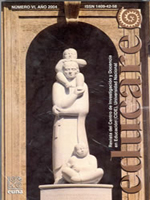Educación inclusiva
DOI:
https://doi.org/10.15359/ree.2004-6.2Abstract
Poverty is a characteristic in Latin American reality. In association to it, social exclusion, citizenship, economics, cultural and ethnic issues are present in Latin societies. Upon this exclusion, education plays a hoping part as a way to overcome the difficulties that limits human development.
Costa Rica is a part of this reality. Multicultural aspects caused by foreign migration and social/cultural differences within costarricans generate exclusion.
Inclusive education propose itself as a media to integrate all of these aspects, as a way to assure that both, rich and poor, can access human promotion. To include implies a wholesome vision and a reflexive look upon current curriculum, considered it within the social context.
References
Congregación Salesiana (1994). Actas del Encuentro Latinoamericano de Estudio. Proceso educativo salesiano y culturas emergentes. Quito.
Amaiz, P. (1995). Integración, segregación, inclusión. Ponencia presentada en la XXIl Reunión Cienúfica de AEDES, 1 O años de integración en España: análisis de la realidad y perspectiva de futuro. Murcia.
Bustelo, M. (1998). Política Social e igualdad. Todos entran. Propuesta
para una sociedad incluyente. Bogotá: Santillana - UNICEF.
CEPAL - ONU(2000). Panorama Social de América latina (Síntesis).
Santiago: CEPAUONU.
Macal, H. (2003). Escuela incluyente. Memoria del VI Encuentro CERCA
y CIMAC- Mesoamérica. San José.
Stainback, S.-Stainback, W. (1992). Currículum Considerations in Inclusive Classrooms. (Faciliting Leamingfor Ali Students). Baltimore: Paul Brookes.
Published
How to Cite
Issue
Section
License
1. In case the submitted paper is accepted for publication, the author(s) FREELY, COSTLESS, EXCLUSIVELY AND FOR AN INDEFINITE TERM transfer copyrights and patrimonial rights to Universidad Nacional (UNA, Costa Rica). For more details check the Originality Statement and Copyright Transfer Agreement
2. REUTILIZATION RIGHTS: UNA authorizes authors to use, for any purpose (among them selfarchiving or autoarchiving) and to publish in the Internet in any electronic site, the paper´'s final version, both approved and published (post print), as long as it is done with a non commercial purpose, does not generate derivates without previous consentment and recognizes both publisher's name and authorship.
3. The submission and possible publication of the paper in the Educare Electronic Journal is ruled by the Journal’s editorial policies, the institutional rules of Universidad Nacional and the laws of the Republic of Costa Rica. Additionally, any possible difference of opinion or future dispute shall be settled in accordance with the mechanisms of Alternative Dispute Resolution and the Costa Rican Jurisdiction.
4. In all cases, it is understood that the opinions issued are those of the authors and do not necessarily reflect the position and opinion of Educare, CIDE or Universidad Nacional, Costa Rica. It is also understood that, in the exercise of academic freedom, the authors have carried out a rogorous scientific-academic process of research, reflection and argumentation thar lays within the thematic scope of interest of the Journal.
5. The papers published by Educare Electronic Journal use a Creative Commons License:














 The articles published by Educare Electronic Journal can be shared with a Creative Commons License:
The articles published by Educare Electronic Journal can be shared with a Creative Commons License: 



